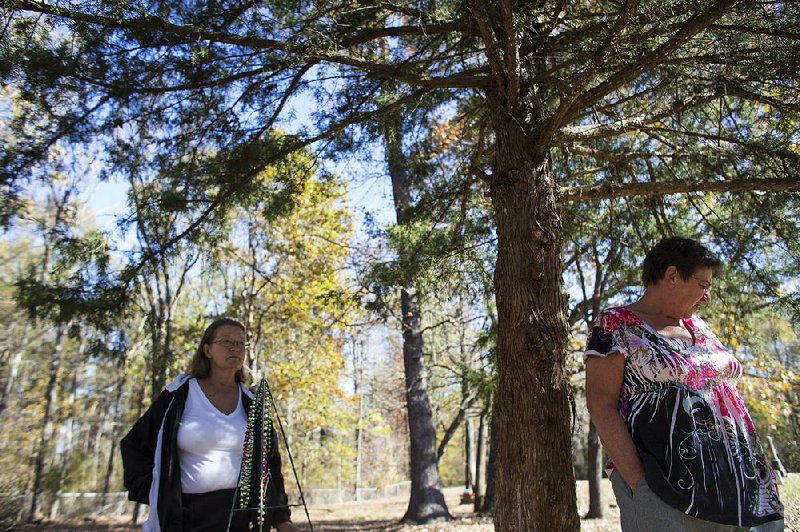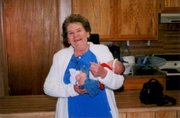PERRYVILLE -- Martha Bull's death at a Greenbrier nursing home in 2008 has been the subject of lawsuits and newspaper articles.
But few people, aside from her family and friends, know much about her 76 years of life. The daughter of a farmer, Bull was one of 16 children, a woman twice widowed, a plain-spoken mother of seven, a Gospel singer on the radio, a cook known for her biscuits and gravy, and, by all accounts, a hard worker.
"The day one of our sisters was born, she cut, split, loaded and hauled eight ricks of wood," along with her husband, said one of her daughters, Rosey Perkins, who lives within walking distance of her mother's former hillside home outside Perryville.
Now the small, two-story house with a screened front porch is vacant. It's almost hidden by trees, shrubs and other plants, among them the primroses that return each spring that Bull so loved.
Long before Bull's name became tied to an increasingly complex series of legal cases, she would have been busy this time of year, harvesting fall vegetables, baking cornbread for the turkey and dressing her family enjoyed during the holidays, and decorating plenty of Christmas trees.
Her family used to stop by her house and decorate a cedar tree in her yard for the holidays. She always had at least one real Christmas tree inside, too.
"There was one year when she had a tree in every room in the house," Perkins recalled during a brief break from deer hunting recently.
Now, Bull is better known to many Arkansans as the woman whose death in a Greenbrier nursing home April 7, 2008, led to a negligence lawsuit against the home.
That case led to another lawsuit accusing nursing-home owner Michael Morton and former state Sen. Gilbert Baker of conspiring to bribe former Circuit Judge Michael Maggio to lower a Faulkner County jury's $5.2 million judgment in the first case to $1 million.
Maggio has pleaded guilty to one federal bribery count. While Maggio awaits sentencing in January, a federal criminal investigation continues.
The second lawsuit is pending.
Morton and Baker have denied wrongdoing. Neither has been charged with a crime.
A Hard Worker
Martha Loucrise Jones was born in Guin, Ala., to a farming couple on Jan. 30, 1932. They later moved to Rose Bud in central Arkansas.
At 18, she married Sherman F. "Frank" Crow, a heavy-equipment operator she'd been corresponding with by mail but had never met "before the day he sent her a bus ticket to Benton," Perkins said.
"She came on the bus one day, and they got married the next day," Perkins said. Her mom was 18; her dad, 29.
He brought two daughters by his first wife to the marriage. His new wife welcomed them.
"'I'm not their stepmom. I'm their mom,'" said Perkins, recalling her mother's words.
In 1970, the Crows moved from Little Rock to Perryville, a small, hilly town at the bottom of the Ouachita National Forest. They moved into the house where they would raise their children. She never moved out.
Martha held various jobs, including work at a restaurant and at a nursing home as a certified nursing assistant. But mainly she stayed busy at home, where she cooked, sewed, gardened, cut wood and fished in a pond behind the house. She also helped her husband with mechanic work -- from changing tires to once pulling him from beneath a vehicle where he'd become trapped.
"Every morning, she made homemade biscuits and gravy," Perkins said.
They were so good that the Crows' children and grandchildren would stop by and eat with their parents, daughter Rhonda Coppak recalled.
Martha didn't waste time in front of the mirror. The only makeup she wore was red lipstick and fingernail polish.
She was frugal, too.
"When breakfast was over, you didn't dare throw [leftovers] out," Coppak said. "You would cover it up" and refrigerate it for later.
She also loved to sew.
"And she made sure all of us kids knew how to cook, sew and quilt," Perkins said.
Perkins and Coppak made the skirts and blouses they wore to the first trial.
Their mother loved the outdoors. When fishing in a creek of the Arkansas River, their parents would sometimes take their skillets, oil, meal and corn, then cook what they caught.
Martha even had time to join three of her sisters when they sang Gospel music on an area radio station. "Mansion Over the Hilltop" was a favorite, her daughters said.
Perkins said her mother was "a giving person." She gave clothes and quilts to a rehabilitation facility for people with drug and alcohol addictions and didn't hesitate to help others, her daughters said.
Once, she stopped along a highway to help an elderly man change a tire.
"She put a $100 bill in his pocket," Perkins said. "He wouldn't take it," so her mom gave it to a woman who was with him.
"Later, he called saying he wanted to return it," Perkins said. "She said, 'No, you may need to help me sometime.'"
Friends recall Martha as a woman who spoke her mind.
She was "a gruff-talking lady," but she "kind of did it in a kidding way," said William "Willie" Jones of Perryville.
Melvin Campbell of Casa in Perry County said she had a sense of humor.
"If you didn't know her, she might have made you mad. If you knew her, you'd know she was just joking," he said.
"She was just a caring person," recalled Campbell, who said he knew her for years. "She'd give you whatever she thought you needed. After my mother died, she would call me once or twice a month, sometimes once a week, to see how I was doing."
And she kept calling him until she no longer was able, he said.
"I remember her getting out cutting wood just like a man," former Perry County Sheriff Ray Byrd said.
"She was always friendly every time you saw her," Byrd said. "She was plain-spoken. She meant what she said, and she said what she meant. You never had to wonder what Martha was thinking."
Frank Crow died in 1989. His widow later would remarry. Her second husband, Faye Bull, would live just about a year after their wedding.
Surrounded by Family
Martha Bull's family said she had been in good health until she suffered a mild stroke in February 2008. While hospitalized for the stroke, she suffered an abdominal abscess.
Perkins, sitting beside her sister Coppak, said their mother had argued that she should enter the home because she didn't want to be too much of a burden on Perkins.
"I was fighting her on going," Perkins said.
Her strong-willed mother won that battle, and on March 28, 2008, Bull entered Greenbrier Nursing and Rehabilitation Center for what the family's attorney, Thomas Buchanan, has called a "30-day rehab."
After she became stronger, he said, the plan was for Bull to have further treatment for the abscess.
Family members opted for the Greenbrier home, even though it wasn't the closest to them, in part because Coppak's daughter Leanne Dixon worked there as a certified nursing assistant. She was working the 11 p.m. to 7 a.m. shift when her grandmother fell extremely ill and did not see her in the hours before her death, Coppak said. She quit a short time later.
Perkins saw her mother for the last time April 6, 2008, a Sunday.
"Her exact words to me were, 'I've been walking some. I'm ready to go home. Please take me home.'"
Perkins, a nurse at the time, began crying as she remembered telling her mother that she had to work but that she'd be back the next Wednesday to take her home.
"Little did I know I wouldn't be able to take her home," Perkins said.
Bull died the next day -- April 7, 2008 -- after complaining of nausea and abdominal pain, a state report said. She was given a suppository, a Tylenol and the antacid Mylanta. She was also prescribed an anti-depressant.
A nurse found her dead late that night.
Earlier in the day, someone from the nursing home had called Coppak, who missed the call because she was working on a vehicle in her garage.
"All they said [in the phone message] was, 'Your mom's in pain,'" Coppak recalled.
Coppak said she called the home back.
"I said, 'Do I need to meet you at ER?' They said no."
The next day, someone at the home found a physician's fax from the day before. It advised the home to take Bull to an emergency room.
Neither Morton nor his attorneys had any comment for this article, Morton spokesman Matt DeCample said.
Now, Bull is buried beside her first husband, Frank Crow, at Antioch Cemetery. She once mowed the small church graveyard about a mile from her home.
A great-grandson who died in infancy in 2006 is buried nearby. So is one of her sisters. Family friends are buried in a neighboring plot.
Five bouquets of artificial flowers -- one on a small cross -- marked the grave site on a sunny November day. Colorful beads -- perhaps placed there by some of Bull's grandchildren -- hang from a pedestal.
At the foot of the burial plot stands a cedar tree like the ones that once decorated Bull's yard. Relatives planted this one after Frank Crow died. A huge, older tree also towers over the grave site.
For Perkins and Coppak, it's still hard to visit the graves, but they do.
"My mama keeps coming and telling me, 'Put it all in God's hands, Rosey,'" Perkins said.
State Desk on 11/29/2015

